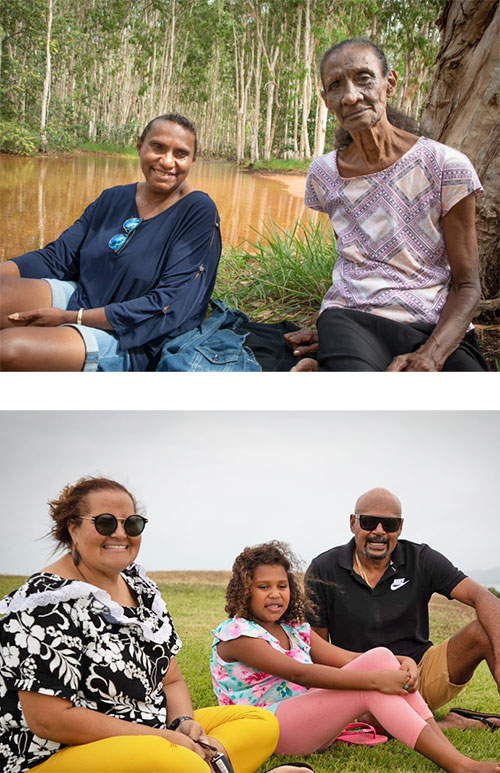
The initiative
Families are First celebrates strong, proud, thriving Aboriginal and Torres Strait Islander families. It's an initiative of the QFCC which aims to improve understanding about how Aboriginal and Torres Strait Islander families have raised happy and healthy children and overcome challenges for more than 60,000 years.
To help create the foundation for the Families are First movement, we are collecting stories by journeying across Queensland, speaking with families and communities to build on and share the rich understanding of culture and connection in child-rearing.
Aboriginal and Torres Strait Islander families can also join the movement by uploading their own stories. These stories can come from parents, children, Aunties and Uncles, Elders and community members.
We acknowledge all the Aboriginal and Torres Strait Islander peoples who have become part of the Families are First movement, generously offering their time and wisdom.
The story of a deadly family
“Strong male role models are so important for both boys and girls. Children take more from seeing and doing rather than just being told.
I hope when my son and daughter get to the stage where they are making life choices that they'll reflect on their role models and make choices based on the adults they had in their lives when they were growing up.”
Mother, Birri Gubba, NQ
The Families are First movement is an opportunity to change how Aboriginal and Torres Strait Islander families are spoken about in the media through collecting positive stories from around Queensland.
By sharing these stories across social media platforms we are not limited by what traditional media considers newsworthy.
It’s a chance for Aboriginal and Torres Strait Islander people to take control of the narrative and share both challenges and successes. It also provides an opportunity for other Queenslanders to better understand Aboriginal and Torres Strait Islander child rearing and cultural traditions.
When we say family we are talking in the broadest sense to include those helping to raise children such as mums, dads, carers, grandparents, uncles, aunts, siblings, cousins and Elders. We also include members of the community who are considered family and the community supports available to help children grow and thrive.
Storytelling has been an important way to pass on knowledge in Aboriginal and Torres Strait Islander communities for thousands of years.
Gathering these stories will build a resource for all Queensland parents, carers and organisations to find information about Aboriginal and Torres Strait Islander child-rearing practices and learn from positive role models in the community.
While each story is different they all centre on the theme of family.
Parents, children, extended family, Elders and community members tell the stories.
Stories can be about the:
- every day things families do every day, which may not seem big but mean a lot to children
- big things that families have done to overcome a challenge
- ways families have been champions for their child or children in their community
- deadly things families do to stay deadly
- ways families make sure children stay connected to language, culture and country.
There are two ways stories are collected.
One way is for Aboriginal and Torres Strait Islander families to create and share their own unique stories by uploading them on this website.
The other is through our engagement with Aboriginal and Torres Strait Islander families, communities and organisations across Queensland to find participants and provide the opportunity for people to tell their story.
We use three methods to collect stories:
- Exploring - the attitudes, behaviours, beliefs, knowledge and skills that Aboriginal and Torres Strait Islander families use to raise happy children and deal with challenges.
- Celebrating - families’ positive stories of raising children.
- Sharing - positive stories with Aboriginal and Torres Strait Islander communities, the general public, relevant professional sectors, and the media.
The family decides how to provide their story.
Video, audio, still photography, an art piece (with a written story), song or written words are some of the ways families may choose to tell their story.
Our Families are First team is equipped with cameras and microphones and, depending on capacity, may be able to assist families in recording and producing their story.
All stories are shared respectfully and with the family/participant’s full consent. Participants have the final say in where the story can be shared and at any time can request to have the story removed.
When the participant gives their final approval, stories are uploaded to our YouTube channel and published on this website in the Our stories section. They will also be promoted on social media. At other times we may use other media such as radio but this is only if the participant has given their approval.
Participants are notified when their stories are about to be published so they can share the news with friends, family and community on social media.
Where appropriate, organisations are also encouraged to share the stories through their networks.
Organisations can assist by promoting the movement within the community and identifying potential participants who have a positive story to share. The organisation can help participants create and share their stories or they can contact the Families are First team to see when they might be visiting.
Last updated
28 June 2022

